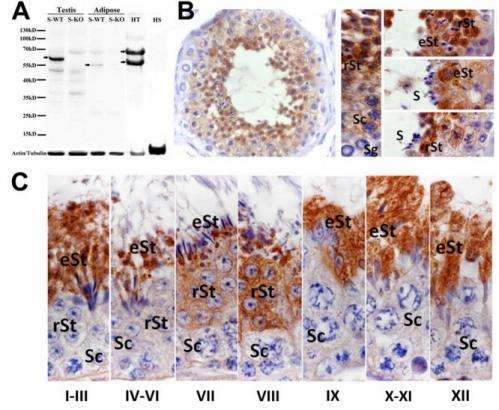April 29, 2014 report
Lack of seipin in testes could cause male infertility

(Medical Xpress)—Jiahao Sha and his colleagues at Nanjing University in China studied humans and mice with genetic abnormalities that prevent them from producing a protein called seipin. Lack of seipin causes body fat to degenerate. The researchers found that lack of testicular seipin could cause infertility. However, lack of seipin in adipose tissue has no effect on fertility. The research appears in the Proceedings of the National Academy of Sciences.
Scientists are aware of a link between body fat and fertility in men. Obesity makes men less fertile. However, the relationship between low body fat levels and fertility is less clear. One study has shown that men with low BMIs have an increased, but insignificant risk of abnormal sperm count.
To explore this issue further, Sha and his colleagues studied a genetic disorder called Berardinelli–Seip congenital lipodystrophy (BSCL), caused by a mutation that prevents the production of seipin, which normally is produced in adipose tissue, the testes and the brain. People with this rare condition suffer from lipodystrophy, an abnormal degeneration of body fat. They also experience hypertriglyceridemia, hyperinsulinemia and hepatomegaly.
Sha's team had found an earlier study showing that men with BSCL are fertile. However, when the team previously studied mice lacking seipin, they discovered that the mice were infertile as well as unable to store body fat.
The team then studied a human male patient suffering from BSCL. They found he had abnormal sperm. Some sperm were bundled together so that two or more sperm were connected. The heads of these bundled sperm had large ectopic lipid droplets.
To gain a better understanding of how seipin affects male fertility, the researchers bred strains of mice that lacked seipin in their testes, their adipose tissue or both. Male mice with seipin in their testes but not their adipose tissues had low body fat levels but could reproduce. Males with seipin in their adipose tissue but not their testes had normal body fat levels but did not produce any offspring. Males lacking both testicular and adipose tissue seipin had low body fat levels and appeared to be infertile.
The mice lacking testicular seipin had low sperm counts, low percentages of motile sperm and high percentages of abnormal sperm. Like the human BSCL patient, they had bundled sperm with large ectopic lipid droplets. Analysis of the testes revealed high levels of phosphatic acid and abnormal ratios of polyunsaturated to monounsaturated and saturated fatty acids.
Sha's team believes seipin in the testes modulates testicular phospholipid homeostasis. Lack of testicular seipin causes a disturbance in homeostasis, which results in infertility.
More information: Lack of testicular seipin causes teratozoospermia syndrome in men, Min Jiang, PNAS, 2014. DOI: 10.1073/pnas.1324025111
Abstract
Obesity impairs male fertility, providing evidence for a link between adipose tissue and reproductive function; however, potential consequences of adipose tissue paucity on fertility remain unknown. Lack of s.c. fat is a hallmark of Berardinelli–Seip congenital lipodystrophy type 2 (BSCL2), which is caused by mutations in BSCL2-encoding seipin. Mice with a targeted deletion of murine seipin model BSCL2 with severe lipodystrophy, insulin resistance, and fatty liver but also exhibit male sterility. Here, we report teratozoospermia syndrome in a lipodystrophic patient with compound BSCL2 mutations, with sperm defects resembling the defects of infertile seipin null mutant mice. Analysis of conditional mouse mutants revealed that adipocyte-specific loss of seipin causes progressive lipodystrophy without affecting fertility, whereas loss of seipin in germ cells results in complete male infertility and teratozoospermia. Spermatids of the human patient and mice devoid of seipin in germ cells are morphologically abnormal with large ectopic lipid droplets and aggregate in dysfunctional clusters. Elevated levels of phosphatidic acid accompanied with an altered ratio of polyunsaturated to monounsaturated and saturated fatty acids in mutant mouse testes indicate impaired phospholipid homeostasis during spermiogenesis. We conclude that testicular but not adipose tissue-derived seipin is essential for male fertility by modulating testicular phospholipid homeostasis
© 2014 Medical Xpress

















